Students can Download 1st PUC Sanskrit Model Question Paper 3 with Answers, Karnataka 1st PUC Sanskrit Model Question Papers with Answers help you to revise complete Syllabus and score more marks in your examinations.
Karnataka 1st PUC Sanskrit Model Question Paper 3 with Answers
समयः : 3 घण्टाः 15 निमेषाः
अङ्काः : 100
I. एकवाक्येन संस्कृतभाषया उत्तरं लिखत (1 × 10 = 10)
प्रश्न 1.
ब्रह्मणः ज्येष्ठपुत्रः कः?
उत्तरः
ब्रह्मणः ज्येष्ठपुत्रः अथर्वः।
प्रश्न 2.
त्यागे रामः केन समः?
उत्तरः
त्यागे रामः धनदेन समः।
प्रश्न 3.
कपिञ्जलः कुत्र वसति स्म?
उत्तरः
कपिञ्जलः कस्मिंश्चिदृक्षस्य अधस्तात्कोटरे वसति स्म।
![]()
प्रश्न 4.
हनूमतः पिता कः?
उत्तरः
हनूमतः पिता वायुः।
प्रश्न 5.
दशरथस्य कृते महर्षिभाषितं कीदृशम् अभूत्?
उत्तरः
दशरथस्य कृते महर्षिभाषितं सशल्यान्तःकरणोऽभूत्।
प्रश्न 6.
कन्यार्थेषु के गृहिणीनेत्राः भवन्ति?
उत्तरः
कुटुम्बिनः कन्यार्थेषु गृहिणीनेत्राः।
प्रश्न 7.
कुत्र अन्धकारः आवृतः?
उत्तरः
ज्यौतिषिकस्य कार्यक्षेत्रे अन्धकारः आवृतः।
प्रश्न 8.
गोपकन्यकाः दामोदरं वारयितुं कम् आकारयन्ति?
उत्तरः
गोपकन्यकाः दामोदरं वारयितुं संकर्षणम् आकारयन्ति ।
प्रश्न 9.
नभसोऽपि किं महत्?
उत्तरः
नभसोऽपि ब्रह्मा महत्।
![]()
प्रश्न 10.
वैशाली नाम पुरी कः प्रशशास?
उत्तरः
सेनजिदभिदो राजा वैशाली नाम पुरी प्रशास।
II. द्वित्रैः वाक्यैः संस्कृतभाषया – कन्नडभाषया – आङ्ग्लभाषया वा उत्तरं लिखत। (पञ्चानामेव) (2 × 5 = 10)
प्रश्न 11.
ब्रह्मविद्यायाः परम्परां लिखत ।
उत्तरः
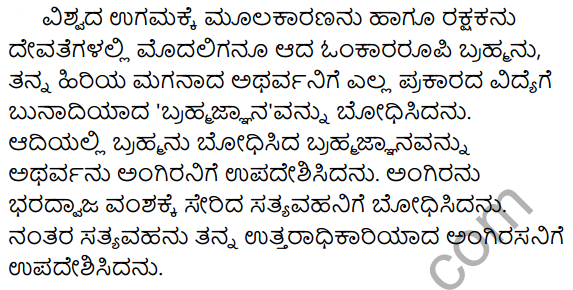
Brahma, the creator of the universe and the sustainer of the world, was the first among the Gods. He told his eldest son Atharva about the knowledge of Brahman, the foundation of all knowledge. The knowledge of Brahman about which Brahma told Atharva, Atharva, in olden times, told Angir. Angir taught it to Satyavaha belonging to the clan of Bharadwaja and Satyavaha taught it in succession to Angirasa.
प्रश्न 12.
वायस-कपिञ्जलयोः कालः कथं गच्छति स्म?
उत्तरः
सदैवास्तमनवेलायांमगतयो वायस-कपिञ्जलयोः अनेक सुभाषितगोष्ठ्या देवर्षिब्रह्मर्षिराजर्षिभिः पुराणचरित कीर्तनेन च पर्यटनदृष्टानेककौतूहलप्रकथनेन च परमसुखनुभवतो कालो गच्छति स्म।
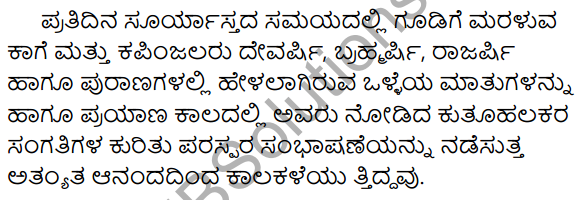
Every day, at sunset, the crow and Kapinjala would return home and tell each other stories about Rishis and such things, and talk over together what had happened during the day. In this way, they passed their time happily.
प्रश्न 13.
भीमसेनः हनूमतः विषये किं वदति?
उत्तरः

Bheemasena says thus about Hanuman: He was my brother, excellent in all accomplishments and endowed with both intelligence and strength. That handsome and foremost of monkeys is celebrated in the Ramayana.
प्रश्न 14.
मुनयः किमर्थं हिमवतः समीपम् आगताः?
उत्तरः
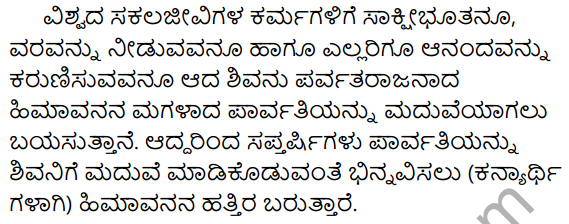
Shiva, who is the bestower of happiness on all, the witness of the doings of the world and the bestower of desired objects upon all, desired to marry Parvathi, the daughter of Himavan, the lord of the mountains. Hence, the divine sages go to Himavan with a marriage proposal on behalf of Lord Shiva.
प्रश्न 15.
सुभाषितोक्तरीत्या लोकस्थितिः कीदृशी?
उत्तरः
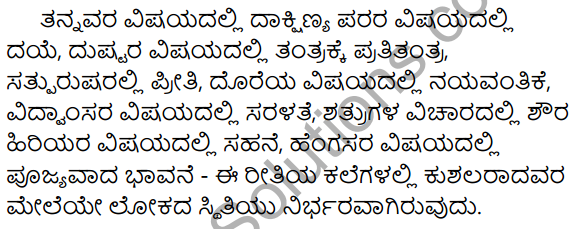
Courtesy towards his own people (kinsmen), kindness to others, toughness with wicked people, love for good people, diplomacy with royal people, simplicity with the learned, courage against enemies, patience with elders, respect to women – thus, those men skilled in the fine arts become responsible for the permanence of the world.
![]()
प्रश्न 16.
‘श्री’ महोदयस्य शिष्यवात्सल्यम् ।
उत्तरः
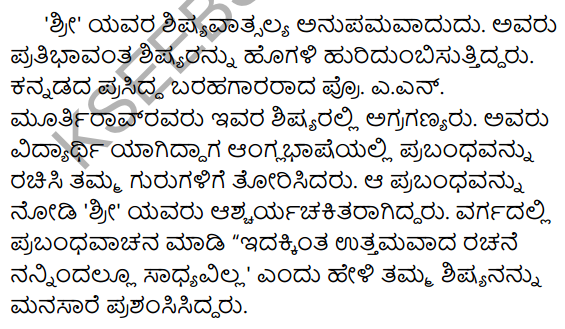
The love of ‘Shri’ for his students remained unparalleled. He always encouraged bright and talented students by praising them. Prof. A.N. Murthyrao, the popular Kannada writer, was a student par excellence of Shri. When he was his student he would show all the articles written by him in English to his teacher. Seeing the articles, Shri was surprised. Having read the articles, in the classroom he praised the student wholeheartedly thus:”This kind of excellent composition is not possible even from me”.
प्रश्न 17.
कूडलसङ्गम प्रसादनस्य पद्धतिः का?
उत्तरः
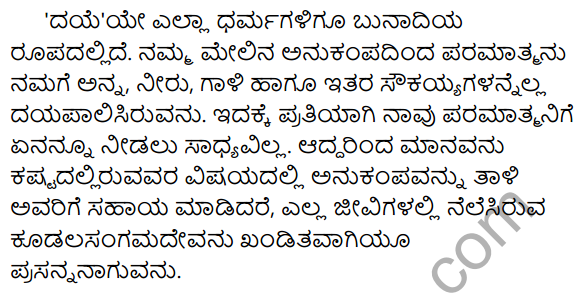
The root of religion is compassion. Indeed God has given us water, food, air and other enjoyments primarily due to compassion for us. We are incapable of returning the favour. Hence, we must show compassion for all creatures. Only then Kudalasangamadeva, who is found in all creatures of this universe, will be pleased.
III. पाठनाम उल्लिख्य श्लोकानाम् अनुवादं कन्नडभाषया आङ्ग्ल-भाषया वा कुरुत (त्रयाणाम एव) (3 × 3 = 9)
प्रश्न 18.
मृदुश्च स्थिरचित्तश्च सदा भव्योऽनसूयकः।
प्रियवादी च भूतानां सत्यवादी च राघवः॥
उत्तरः

Sri Rama (a scion of Raghu) is gentle and stable of mind, ever gracious and uncapping speaks kindly to all living beings and is veracious too.
प्रश्न 19.
उत्तिष्ठ देहि मे मार्गं पश्य वा मेऽद्य पौरुषम्।
मच्छासनमकुर्वाणं त्वां वा नेष्ये यमक्षयम् ॥
उत्तरः

Arise, therefore, give me the way or witness my prowess today. If you fail to do what I say, I shall send you to the abode of Yama.
प्रश्न 20.
एते वयममी दाराः कन्येयं कुलजीवितम् ।
ब्रूत येनात्र वः कार्यं अनास्था बाह्यवस्तुषु ॥
उत्तरः

Here I am, here is my wife; here is my daughter, who is the life of my family. Tell me which ne of us you want to be at your service. Or else, our wealth has no worth.
प्रश्न 21.
चलन्ति गिरयः कामं युगान्तपवनाहताः।
कृच्छ्रेऽपि न चलत्येव धीराणां निश्चलं मनः॥
उत्तरः

Even the hills and mountains waver when hit by destructive hurricanes. But, the steady minds of great people will not waver even when faced with difficulties.
![]()
प्रश्न 22.
तृणानि भूमिरुदकं वाक् चतुर्थी च सूनृता।
एतानि तु सतां गेहे नोच्छिद्यन्त कदाचत ॥
उत्तरः
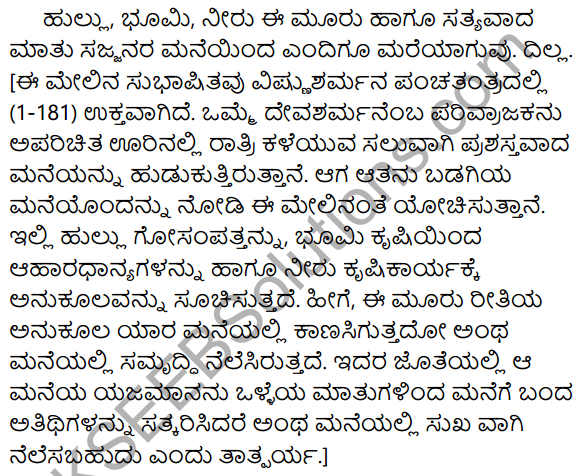
Grass, land, water, words which are truthful are all found in the houses of virtuous or noble people and they are never uprooted. (The above verse is found in Vishnusharma’s ‘Panchatantra’ (1-181). Once a monk by name Devasharma was looking for a place for an overnight stay in an unknown village. He found the house of a carpenter and started thinking thus – “One can nourish the cattle by grass, food grains by ploughing the land and supplying water to fertile lands. Thus, in whose house these three benefits are there such a house would be prosperous. Along with these, where the owner of the house has pleasant speech and treats the guests well in such a house one can live happily.)
IV. पाठनाम उल्लिख्य कः कं प्रति अवदत्? इति – संस्कृतभाषया लिखत (चतुर्णामेव)। (4 × 2 = 8)
प्रश्न 23.
सर्वमिदं विज्ञातं भवतीति।
उत्तरः
इदं वाक्यं ‘द्वे विद्ये वेदितव्ये’ इति पाठात् उद्धृतम् ।
वाक्यमिदं महाशालं शौनकः अङ्गिरसं प्रति अवदत् ।
प्रश्न 24.
यो हीनवादी स ते भक्ष्यः।
उत्तरः
इदं वाक्यं ‘विवादः विनाशाय’ इति पाठात् उद्धृतम् ।
इदं वाक्यं कपिञ्जल शीघ्रगौ तीक्ष्णदंष्ट्रो नाम अरण्यमार्जारं प्रति अवदताम् ।
प्रश्न 25.
व्यापदनीया त्वयेति।
उत्तरः
इदं वाक्यं ‘महर्षिवचनपालनम्’ इति पाठात् उद्धृतम्।
इदं वाक्यं विश्वामित्रः श्रीरामं प्रति अवदत्।
प्रश्न 26.
अत्यन्तं श्रान्तोऽसि।
उत्तरः
इदं वाक्यं ‘ज्यौतिषिकस्य दिनम्’ इति गद्यभागात् उद्धृतम् ।
वाक्यंमिदं ज्यौतिषिकः गुरुनायकं प्रति अवदत् ।
![]()
प्रश्न 27.
नागं मे वशं करोमि।
उत्तरः
इदं वाक्यं ‘सान्तःपुरः शरणागतोऽस्मि’ इति पाठात् उद्धृतम्।
इदं वाक्यं दामोदरः संकर्षणं प्रति अवदत्।
प्रश्न 28.
अहो धिङ् मां इमौ स्वार्थिनौ सखायौ।
उत्तरः
इदं वाक्यं ‘सन्मित्रम्’ इति पाठात् उद्धृतम् ।
इदं वाक्यं देवव्रतः स्वमनसि अचिन्तयत्।
V. दशवाक्यैः संस्कृतभाषया कन्नडभाषया, आङ्ग्लभाषया वा लघुटिप्पणीः लिखत। (चतुर्णामेव) (5 × 4 = 20)
प्रश्न 29.
मार्जारस्य धर्मोपदेशः।
उत्तरः
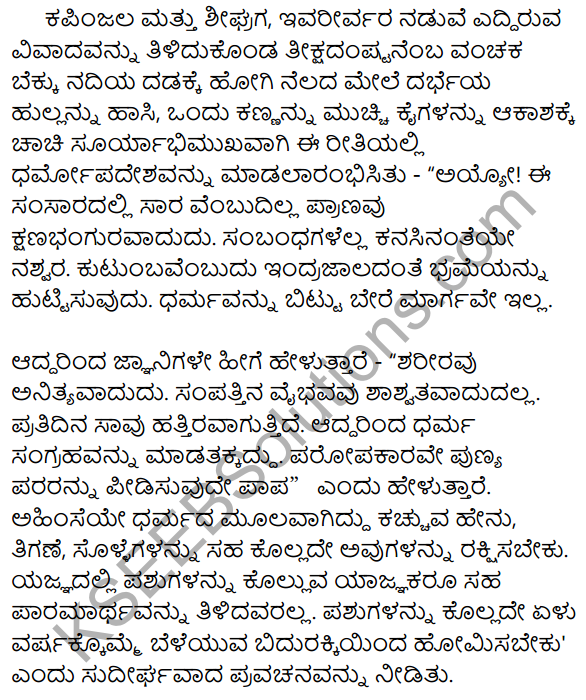
A wild tomcat, by the name of Teekshadaunstra, came to know about their dispute. He went and stood in their path, on the bank of the river. In his paw, he held a blade of Kusha grass. He closed his eyes, stood on his hind legs, facing the sun, and began giving a discourse on morals.
“Ah! Life is transitory and this world is futile. The company of loved ones is nothing but a dream and the presence of the family like the trick of a conjurer. They say:
Our bodies are perishable And even our money does not last forever, We face death continually, So we must live according to the Shastras. A man who passes his days irreligiously, Is like an ironsmith’s bellows Which breaths, yet has no life!
“Why make a long story of it? I’ll tell you what religion is, in a nutshell. To do good to others is virtuous but harming others is a sin.”
I have given up that violent way of life which leads directly to hell. The sages have declared non-violence to be the essence of true religion. It’s wrong to kill even lice, bugs and mosquitoes.
प्रश्न 30.
भीमसेनस्य पात्रचित्रणम् ।
उत्तरः
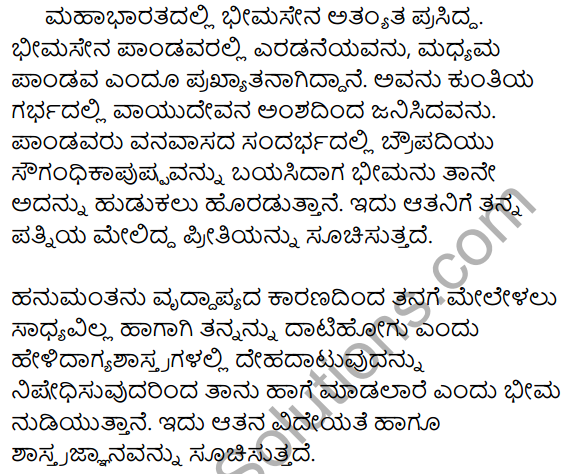
Bheema is one of the most famous characters in the epic ‘Mahabharata’. Bheema was the second of the Pandavas. He was born of Kunti. However, his father was Vayu. When Draupadi, during their exile in the forest, wanted to have the Saugandhika flower, it was Bheema who volunteered to search for it. This shows his love for his wife.
![]()
As he goes in search of the flower he finds a monkey sitting coolly, blocking his way. Bheema asks the monkey to move out of his way. But, the monkey says that being told he has no strength to move and asks Bheema to leap over him and go. But, Bheema replies that it is disrespectful to an elder, otherwise, he would have jumped over him. This shows that Bheema was not only modest but also had good knowledge of the scriptures.
प्रश्न 31.
ताटकावधसन्दर्भे श्रीरामस्य सन्देहः कः? सः कथं निवारितः।
उत्तरः
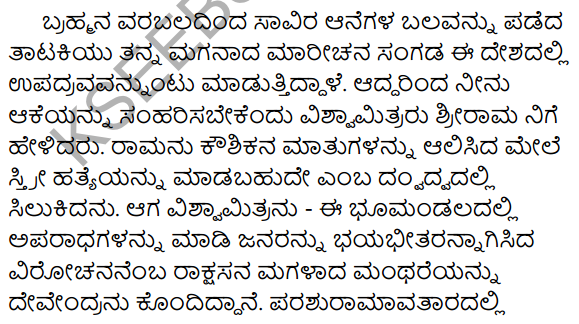

Once, after Sunda was killed, Maricha committed an outrage against sage Agastya and was turned into a demon by his curse. Tataka also became a man-eater. She got the strength of a thousand elephants by a boon of the lotus-born, Brahma, and together with her son, began causing calamities to the countries. Now, she is to be slain by you.
Hearing this, Rama had a doubt about killing a woman. But, Viswamitra cited the example of Manthara, daughter of Virochana, being killed by Indra for her crimes against the earth, and also that of Bhargava’s (sage Sukra’s) mother i.e., the wife of Bhrugu, being killed by the Lord Vishnu. He thus removed Rama’s great perplexity about the killing of Tataka. Rama gave word to kill Tataka.
प्रश्न 32.
ज्यौतिषिकस्य पूर्वजीवनवृत्तान्तः।
उत्तरः
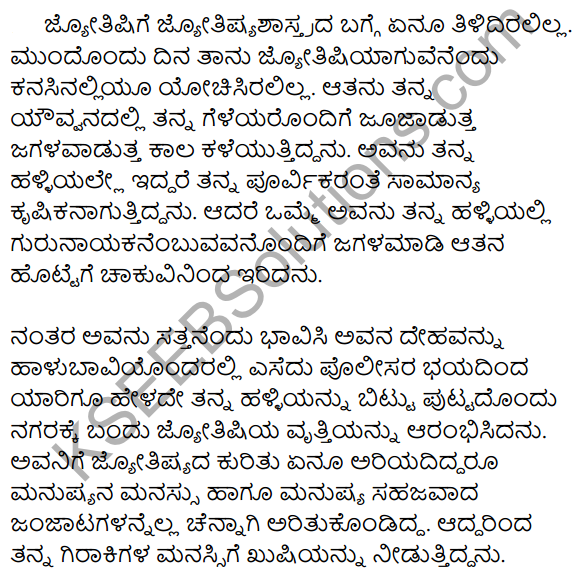
The astrologer was devoid of any professional training. During his youth, he used to drink, gamble and quarrel. He had left his village without any prior thought or plan. If he had continued there he would have carried on the work of his forefathers namely, tilling the land. Once he hit a fellow villager hard on his head and assuming the person dead, he pushed him into a well. To hide from the police he ran away and settled as an astrologer in a small town. Even though he lacked training, he had all the shrewdness and understanding of the human mind and the causes of human worries. That is why he could answer the questions of his clients convincingly.
प्रश्न 33.
‘सान्तःपुरः शरणागतोऽस्मि’ इति पाठस्य शीर्षिकां समर्थयत।
उत्तरः
‘सान्तःपुरः शरणागतोऽस्मि’ इति पाठ्यभागे दामोदरः दुष्टमहोरगस्य कालियस्य गर्वभङ्गं कथं करिष्यतीति वर्णितमस्ति। एकदा दामोदरः मित्रै सह यमुनाह्रदं गच्छति। कालियोनाम दुष्टमहोरगः परिवारेण सह यमुनाह्रदं प्रविश्य वसति स्म। कालियविषेण यमुनाजलं विषयुक्तं भवति। गोकुलवासिन्यश्च सर्वाः जीवराशयः महासंकष्टान् अनुभवन्ति। व्याघ्रा वराहा हस्तिनः हृदस्य पानीयं पीत्वा तत्र तत्रैव विम्रियन्ते। एतद्विषयं ज्ञात्वा दामोदरः कालियमर्दनं कर्तुं निश्चिनोति। तदा कालियः स्वभोगेन प्रहारं करोति। दामोदरः कालियस्य मूर्धाञ्चितैकचरणः चलबाहुकेतुः हल्लीसक नाम नृत्यं करोति। यदा कालियस्य गर्वभङ्गं भवति तदा सः सपरिवारो क्षमा याचति अभयं च। दामोदरः यमुनाहृदं त्यक्त्वा गन्तुं आदिशति सोऽपि तस्य अभयं प्राप्त्वा सपरिवारो यमुनाह्रदं त्यक्त्वा गच्छति।
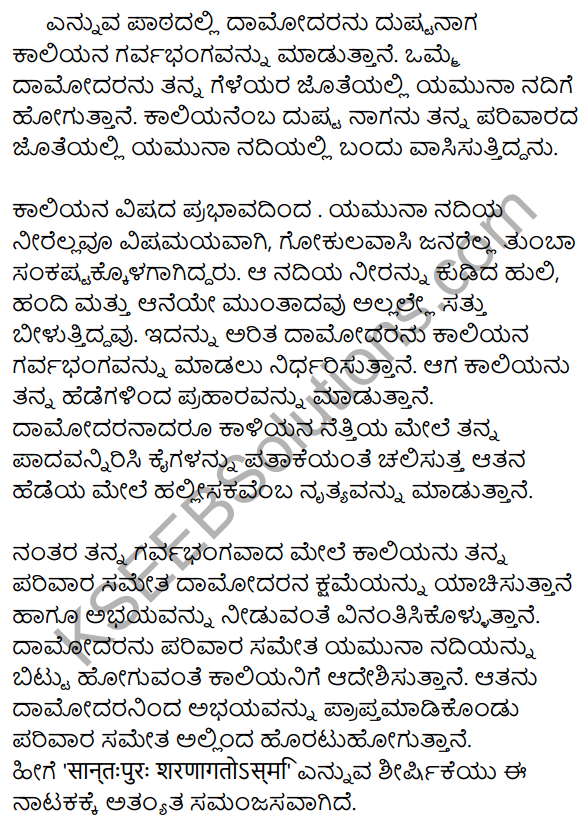
In the play ‘सान्तःपुरः शरणागतोऽस्मि’ Lord Damodara breaks the pride of the wicked serpent by name Kaliya. Once, Lord Damodara along with his friends went to the river Yamuna. The wicked serpent by name Kalia resided there along with his family. The water of the river Yamuna was contaminated due to the poison of Kaliya. The residents of Gokula faced problems due to this. Damodara, having learnt about this, made up his mind to break the pride of Kalia. Seeing Damodara, Kaliya became very angry and tried to seize him in his coils.
Damodara immediately pressed down the serpent’s hood and jumped up on them and waving his arms like flags he performed the dance called Hallisaka. Then the serpent fell at Damodara’s feet and begged his pardon. Damodara took pity on him and told him to leave the river Yamuna along with his family. Finally, having sucked the poison from the river Yamuna, Kaliya went away along with his family. Thus the title ‘सान्तःपुरः शरणागतोऽस्मि ‘ is appropriate.
![]()
प्रश्न 34.
देवव्रत – चन्द्रधरयोः मैत्री वर्णयत।
अथवा
‘श्री’ महोदयस्य कन्नडसेवा।
उत्तरः
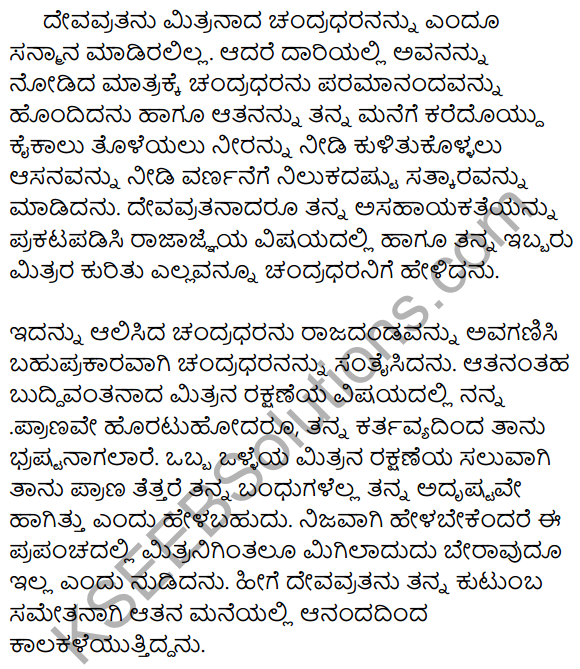
On the way, Devavrata saw Chandradhara, his childhood friend. He had never been honoured. He became extremely happy seeing Devavrata. Being disappointed with his friends, Devavrata.entered the house of Chandradhara. Chandradhara offered him a seat and water for washing his hands and feet. The happiness experienced by Chandradhara was inexplicable.
Having heard his story Chandradhara consoled him Ignoring the order of the king he said, Oh friend, if for saving the life of my learned friend my life is at stake, then also I will not swerve from the path of my duty (responsibility). My relatives consider it as my luck if life is given up: for the sake of a friend. In reality, a friend alone is very important on this earth (in this world)’. Thus, he honoured his friend in his difficulty.
अथवा
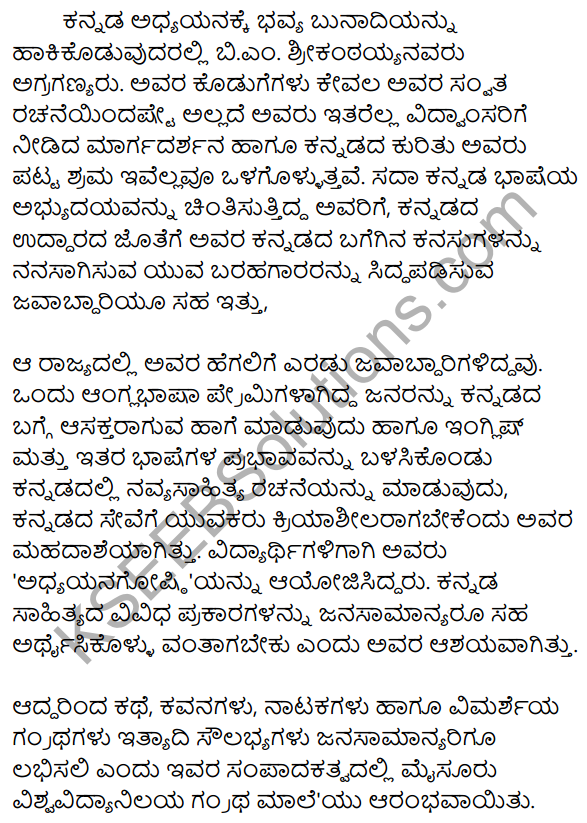
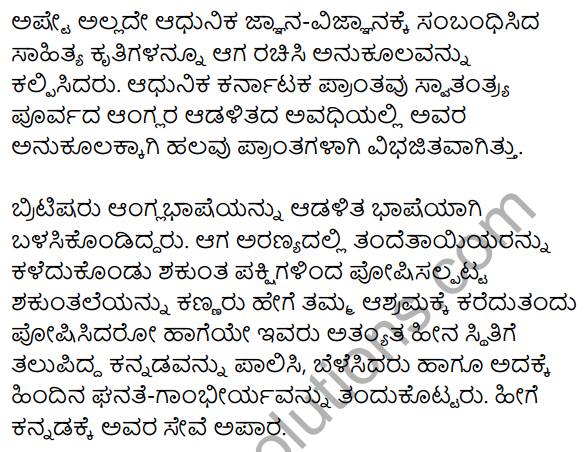
B.M. Srikantaiah was the foremost among the scholars who laid a strong foundation for the study of Kannada language, literature and culture during the first few decades of the 20th century. His contribution is significant not merely because of his personal writings, but also due to the sense of direction and commitment that he gave to generations of scholars. He was responsible for building a dedicated band of creative writers and scholars who strived hard to realize his dreams and added many new dimensions to his ideas.
His great desire was that the youth must engage themselves in the cause of Kannada. He arranged seminars for the sake of students. Under his editorship, the “Mysore Viswavidyanilaya Granthamala” was established to enable common people lay their hands on stories, different forms of poetry, plays and works on criticism. He brought out books relating to knowledge and science that helped the people immensely.
Before independence, the Britishers used English as the administrative language. Everywhere English was used. Just as sage Kanva brought Sakuntala, who was abandoned by her parents and who was looked after by birds and beasts in the forest, to the hermitage and brought her up, similarly Shri nourished the Kannada language which was in a miserable condition, enriched it and reinstated it to its original position. Thus, he served Kannada.
VI. एतासां कृतीनां कवीनां नाम सूचयत (संस्कृतभाषया)। (5 × 1 = 5)
प्रश्न 35.
- रामायणम् ।
- नैषधीयचरितम्।
- पञ्चतन्त्रम्।
- दशकुमारचरितम्।
- मेघदूतम्।
उत्तरः
- वाल्मीकिः
- श्रीहर्षः
- विष्णुशर्मा
- दण्डिः
- कालिदासः
![]()
प्रश्न 36.
दशवाक्यैः संस्कृतभाषया, कन्नडभाषया, आङ्ग्लभाषया वा लघु टिप्पणिं रचयत। (एकस्य) (5 × 1 = 5)
i) उपनिषदः।
उत्तरः
भूमिका
अथवा
ii) पुराणानि।
उत्तरः
भूमिका
VII. मझूषातः सूक्तं पदं चित्वा रिक्तंस्थानं पूरयत। (1 × 3 = 3)
संसारः, प्रथमः, रक्षिता
प्रश्न 37.
- ब्रह्मा देवानां ………… सम्बभूव ।
- ………… स्वस्य धर्मस्य।
- असारोऽयं ………..। VII. संयोजयत –
उत्तरः
- प्रथमः
- रक्षिता
- संसारः
प्रश्न 38.
अ – आ
i) विश्वामित्रः – अ) महाकाव्यम्
ii) कुमारसम्भवम् – आ) गाधिनन्दनः
iii) सङ्कर्षणः – इ) हृदः
iv) यमुना – ई) बलरामः
उत्तरः
i – आ; ii – अ; iii – ई; iv – इ।
IX. रेखाङ्कितानि पदानि आश्रित्य प्रश्ननिर्माणं कुरुत (द्वयोः) (1 × 2 = 2)
प्रश्न 39.
- ते परिसररक्षणम् आद्यं कर्तव्यं मन्यन्ते स्म ।
- सकलेष्वपि प्राणिषु दया आपेक्ष्यते।
- मङ्गलालङ्कृतां सुताम् आददे।
उत्तरः
- ते किम् आद्यं कर्तव्यं मन्यन्ते स्म?
- सकलेष्वपि प्राणिषु किम् अपेक्ष्यते?
- मङ्गलालंकृतां काम् आददे?
X. एतेषाम् उपप्रश्नानाम् उत्तराणि संस्कृतभाषया लिखत (षण्णामेव) (6 × 2 = 12)
प्रश्न 40.
सन्धिं विभजत (द्वयोः)
देवासुरः, बहून्यहानि, तुल्योऽहम् ।
उत्तरः
- देवासुरः = देव + असुरः।
- बहून्यहानि = बहूनि + अहानि ।
- तुल्योऽहम् = तुल्यो + अहम् ।
प्रश्न 41.
सन्धिं योजयत (द्वयोः)
सर्वस्य + औषधम्, पिशित + अशनः, यावत् + निशासमये।
उत्तरः
- सर्वस्य + औषधम् = सर्वस्यौषधम् ।
- पिशित + अशनः = पिशिताशनः ।
- यावत् + निशासमये = यावन्निशासमये ।
![]()
प्रश्न 42.
रिक्तस्थाने सूक्तं विभक्तिरूपं लिखत। (द्वयोः)
- इमाम् इमे ………. ।
- तृणं …………. तृणानि।
- ……… मुनि मुनयः।
उत्तरः
- इमाः
- तृणे
- मुनिः
प्रश्न 43.
रिक्तस्थाने सूक्तं क्रियापदरूपं लिखत। (द्वयोः)
- रक्षतु रक्षताम् …………..।
- भवेयम् …………. भवेम।
- ………… आस्ताम आसन्।
उत्तरः
- रक्षन्तु
- भवेव
- आसीत्
प्रश्न 44.
विग्रहवाक्यं लिखत। (द्वयोः)
अनित्यानि, सूर्यातपः, महावीर्यः।
उत्तर:
- अनित्यानि = न नित्यानि।
- सूर्यातपः = सूर्यस्य आतपः।
- महावीर्यः = महत् वीर्यं यस्य सः।
प्रश्न 45.
समस्तपदं लिखत। (द्वयोः)
भूतानां योनिः, शास्त्रेषु विहितम्, पीवरा तनुः यस्य सः।
उत्तरः
- भूतानां योनिः = भूतयोनिः।
- शास्त्रेषु विहितम् = शास्त्रविहितम् ।
- पीवर तनुः यस्य सः = पीवरतनुः।
प्रश्न 46.
पदपरिचयं कुरुत (द्वयोः)
गत्वा, निरीक्षितुम्, अथ।
उत्तरः
- गत्वा – क्त्वान्ताव्ययम।
- निरीक्षितुम् = तुमुन्नन्ताव्ययम् ।
- अथ = अव्ययम्।
प्रश्न 47.
समानार्थकपदं लिखत।
दुहिता, सचिवः।
उत्तरः
- दुहिता = तनया।
- सचिवः = अमात्यः।
![]()
प्रश्न 48.
विरुद्धार्थकपदं लिखत।
स्वदेशः, स्थावरः।।
उत्तरः
- स्वदेशः = विदेशः।
- स्थावरः = जङ्गमः।
XI. संस्कृतभाषया अनुवदत – (1 × 4 = 4)
प्रश्न 49.
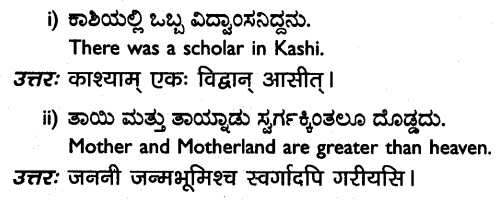
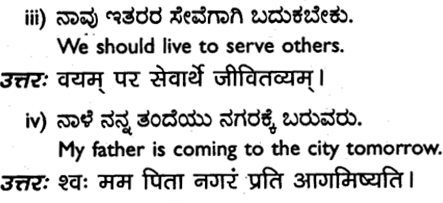
प्रश्न 50.
कन्नडभाषया आङ्ग्लभाषया वा अनुवदत। (1 × 4 = 4)
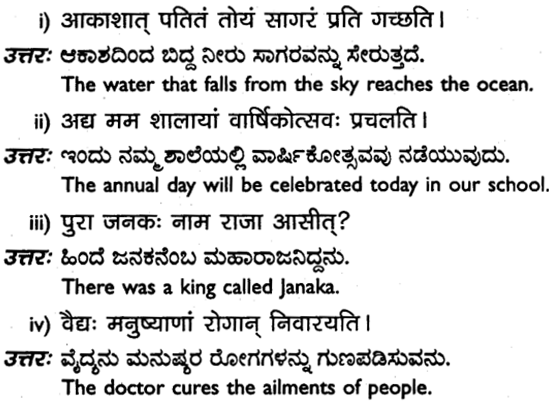
XII. परिच्छेदमिमं पठित्वा प्रश्नानाम् उत्तराणि लिखत – [4]
प्रश्न 51.
कविकुलगुरुरिति विख्यातः महाकविः कालिदासः गुप्तनृपाणाम् आस्थाने अविद्यत। सः सरस्वतीसेवया कवित्वे नैपुण्यम् अलभत। तेन विरचितं काव्यद्वयं महाकाव्यमिति प्रसिद्धिं प्राप्नोत् । तथैव त्रीणि नाटकानि तस्मै विख्यातिम् अदापयन्। अपि च द्वे खण्डकाव्ये सहृदयान् समाकर्षयताम्। तस्य कृतिभिः संस्कृतसाहित्यक्षेत्रं समृद्धं जातम्। एवं कविषु कालिदासः नभसि चन्द्रमा इव अशोभत। अतः अद्यापि कवयः कालिदासं बहादरेण पश्यन्ति।
प्रश्नाः
- कालिदासः किमिति विख्यातः?
- कालिदासः केषाम् आस्थाने आसीत्?
- सः सरस्वतीसेवया किम् अलभत?
- कालिदासस्य कृतिभिः किम् जातम्?
उत्तरः
- कालिदासः कविकुलगुरुरिति विख्यातः।
- कालिदासः गुप्तनृपाणाम् आस्थाने आसीत्।
- सः सरस्वतीसेवया कवित्वे नैपुण्यम् अलभत।
- कालिदासस्य कृतिभिः संस्कृतसाहित्यक्षेत्रं समृद्धं जातम्।